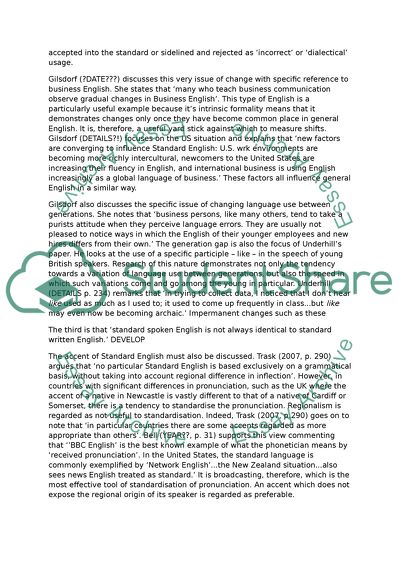Cite this document
(“The Debate Over Standard English Essay Example | Topics and Well Written Essays - 3000 words”, n.d.)
The Debate Over Standard English Essay Example | Topics and Well Written Essays - 3000 words. Retrieved from https://studentshare.org/english/1554508-2examine-the-debate-around-standard-english-in-the-uk-and-explain-the-different-perceptions-which-exist-regarding-correct-english-usage-how-important-is-it-that-all-schoolchildren-learn-to-speak-and-write-in-se
The Debate Over Standard English Essay Example | Topics and Well Written Essays - 3000 words. Retrieved from https://studentshare.org/english/1554508-2examine-the-debate-around-standard-english-in-the-uk-and-explain-the-different-perceptions-which-exist-regarding-correct-english-usage-how-important-is-it-that-all-schoolchildren-learn-to-speak-and-write-in-se
(The Debate Over Standard English Essay Example | Topics and Well Written Essays - 3000 Words)
The Debate Over Standard English Essay Example | Topics and Well Written Essays - 3000 Words. https://studentshare.org/english/1554508-2examine-the-debate-around-standard-english-in-the-uk-and-explain-the-different-perceptions-which-exist-regarding-correct-english-usage-how-important-is-it-that-all-schoolchildren-learn-to-speak-and-write-in-se.
The Debate Over Standard English Essay Example | Topics and Well Written Essays - 3000 Words. https://studentshare.org/english/1554508-2examine-the-debate-around-standard-english-in-the-uk-and-explain-the-different-perceptions-which-exist-regarding-correct-english-usage-how-important-is-it-that-all-schoolchildren-learn-to-speak-and-write-in-se.
“The Debate Over Standard English Essay Example | Topics and Well Written Essays - 3000 Words”, n.d. https://studentshare.org/english/1554508-2examine-the-debate-around-standard-english-in-the-uk-and-explain-the-different-perceptions-which-exist-regarding-correct-english-usage-how-important-is-it-that-all-schoolchildren-learn-to-speak-and-write-in-se.


